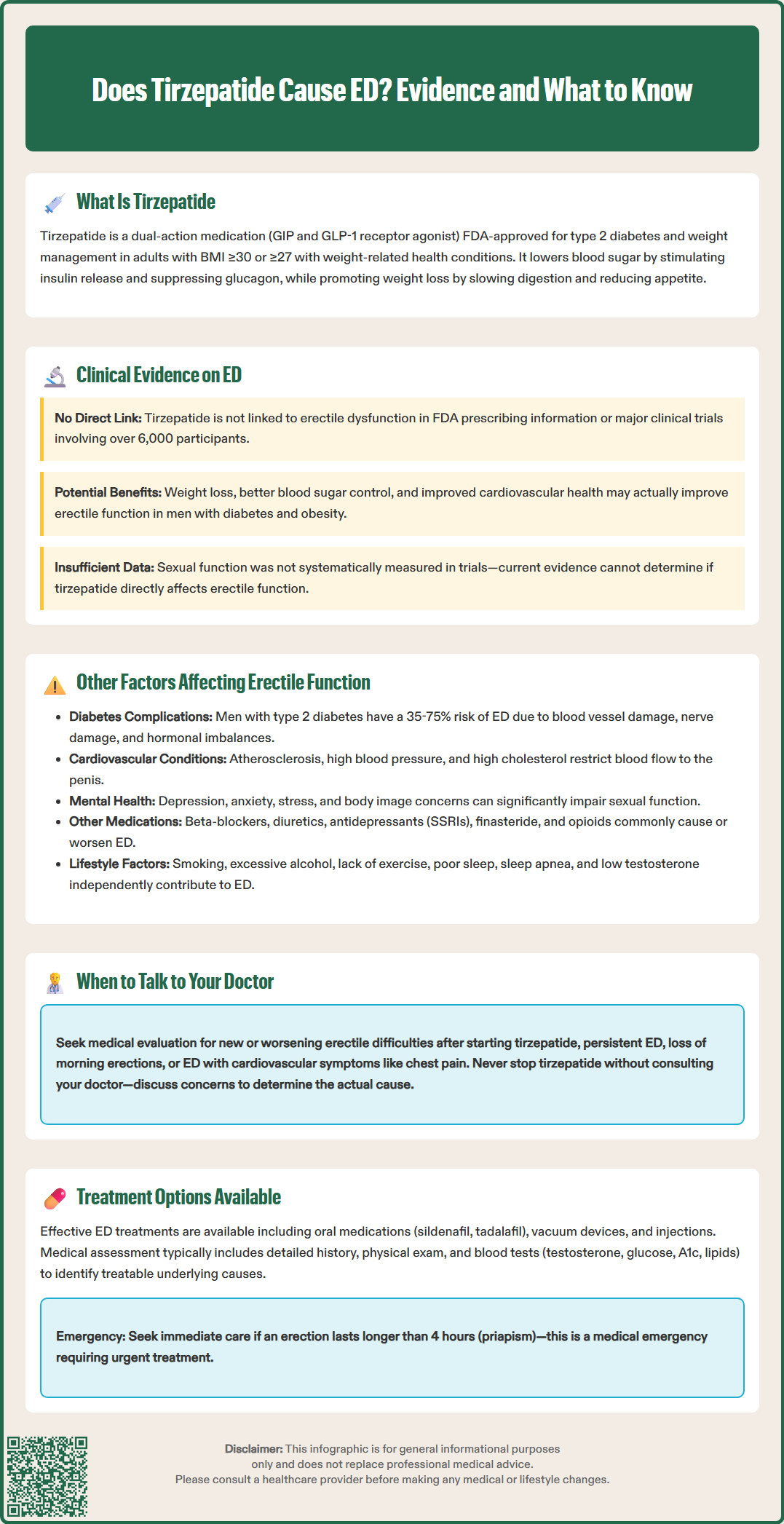LOSE WEIGHT WITH MEDICAL SUPPORT — BUILT FOR MEN
- Your personalised programme is built around medical care, not willpower.
- No generic diets. No guesswork.
- Just science-backed results and expert support.
Find out if you’re eligible

Erectile dysfunction (ED) concerns may arise when starting new medications like tirzepatide, an FDA-approved dual GIP/GLP-1 receptor agonist for type 2 diabetes and weight management. Understanding whether tirzepatide causes ED requires examining clinical evidence, underlying health conditions, and other contributing factors. This article reviews the current data on tirzepatide and sexual function, explores alternative explanations for ED symptoms during treatment, and provides guidance on when to seek medical evaluation for erectile difficulties.
Quick Answer: Current clinical evidence does not establish tirzepatide as a cause of erectile dysfunction, and ED is not listed as a recognized adverse effect in FDA prescribing information.
Tirzepatide is a novel glucose-dependent insulinotropic polypeptide (GIP) and glucagon-like peptide-1 (GLP-1) receptor agonist approved by the FDA for the treatment of type 2 diabetes mellitus (brand name Mounjaro) and chronic weight management (brand name Zepbound). For weight management, it's indicated for adults with a BMI ≥30 kg/m² or ≥27 kg/m² with at least one weight-related comorbidity.
As a dual agonist, tirzepatide works through two complementary mechanisms to improve glycemic control and promote weight loss. The medication enhances glucose-dependent insulin secretion from pancreatic beta cells, meaning it stimulates insulin release only when blood glucose levels are elevated. This mechanism reduces the risk of hypoglycemia, though this risk increases when combined with insulin or sulfonylureas. Tirzepatide also suppresses glucagon secretion, slows gastric emptying, and reduces appetite through central nervous system pathways.
Administered as a once-weekly subcutaneous injection, tirzepatide is typically initiated at 2.5 mg and increased by 2.5 mg every 4 weeks to a target dose of 5-15 mg as tolerated. Common adverse effects include nausea, diarrhea, decreased appetite, vomiting, and constipation, which are generally mild to moderate and tend to diminish over time.
Tirzepatide carries a boxed warning for thyroid C-cell tumors and is contraindicated in patients with a personal or family history of medullary thyroid carcinoma or Multiple Endocrine Neoplasia syndrome type 2. Important safety considerations include pancreatitis, gallbladder disease, and effects of delayed gastric emptying.
Clinical studies have demonstrated improvements in risk factors including body weight, blood pressure, and certain lipid parameters. Understanding how tirzepatide works is essential when evaluating its potential effects on various body systems, including sexual function.

Currently, there is no established clinical evidence directly linking tirzepatide to erectile dysfunction (ED). The FDA-approved prescribing information for tirzepatide (Mounjaro and Zepbound) does not list ED as a recognized adverse effect. In the pivotal clinical trials (SURPASS program for diabetes and SURMOUNT program for weight management), erectile dysfunction was not identified as a common adverse event, though it's important to note that sexual function was not systematically assessed as a prespecified endpoint in these studies.
In the SURPASS clinical trial series, which enrolled over 6,000 participants with type 2 diabetes, adverse event profiles were thoroughly documented through spontaneous reporting. Sexual dysfunction, including ED, was not reported among the common or notable side effects. Similarly, the SURMOUNT trials evaluating tirzepatide for weight management in adults with obesity did not demonstrate a signal for erectile problems compared to placebo in reported adverse events.
It is important to distinguish between causation and correlation when patients report new symptoms during treatment. While individual case reports may emerge in clinical practice, these do not establish a causal relationship. The current evidence is insufficient to determine whether tirzepatide has any direct effect on erectile function.
Some evidence suggests that improvements in metabolic parameters may indirectly benefit sexual function. Weight loss, improved glycemic control, and better cardiovascular risk factors—all documented effects of tirzepatide—are associated with improved erectile function in men with diabetes and obesity. The American Diabetes Association recognizes that better diabetes management can positively impact sexual health outcomes.
Healthcare providers should maintain awareness that sexual dysfunction is multifactorial, and any new symptoms during tirzepatide treatment warrant comprehensive evaluation rather than automatic attribution to the medication.
Erectile dysfunction is a complex condition influenced by multiple physiological, psychological, and lifestyle factors that may coincide with tirzepatide treatment. Understanding these contributing elements is essential for accurate assessment and appropriate management.
Underlying diabetes and metabolic disease represent primary risk factors for ED. Type 2 diabetes causes erectile dysfunction through multiple mechanisms, including vascular endothelial dysfunction, autonomic neuropathy, and hormonal imbalances. Studies indicate that approximately 35-75% of men with diabetes experience some degree of ED, often preceding or accompanying their diabetes diagnosis. The duration and severity of hyperglycemia correlate with ED risk, meaning patients initiating tirzepatide may already have compromised erectile function.
Cardiovascular and vascular health significantly impacts erectile function. Atherosclerosis, hypertension, and dyslipidemia—conditions commonly present in patients prescribed tirzepatide—impair blood flow to penile tissues. ED often serves as an early marker of systemic vascular disease, sometimes appearing 3-5 years before cardiac events.
Psychological factors including depression, anxiety, and stress can profoundly affect sexual function. The diagnosis of diabetes or obesity, lifestyle modifications, and concerns about health complications may contribute to psychological distress that manifests as ED. Additionally, body image concerns during weight loss treatment may temporarily affect sexual confidence.
Concomitant medications must be considered. Many patients taking tirzepatide use other medications that can cause or worsen ED, including:
Beta-blockers (especially non-selective agents) and thiazide diuretics
Selective serotonin reuptake inhibitors (SSRIs) and antipsychotics
5-alpha reductase inhibitors (finasteride, dutasteride)
Opioids, spironolactone, clonidine, and cimetidine
Other medical conditions such as obstructive sleep apnea and hypogonadism (testosterone deficiency) are common in patients with diabetes and obesity and independently contribute to ED.
Lifestyle factors such as smoking, excessive alcohol consumption, sedentary behavior, and poor sleep quality independently contribute to erectile dysfunction. Patients beginning tirzepatide treatment may be addressing multiple health concerns simultaneously, making it difficult to isolate specific causes of new or worsening ED symptoms.
Open communication with your healthcare provider about erectile dysfunction is essential for proper evaluation and management. ED should never be dismissed as an inevitable consequence of aging or chronic disease, as it may signal underlying health conditions requiring attention.
Seek medical evaluation if you experience:
New onset or worsening erectile difficulties after starting tirzepatide
Persistent inability to achieve or maintain erections sufficient for sexual activity
Sudden loss of morning erections or decreased libido
ED accompanied by chest pain, shortness of breath, or other cardiovascular symptoms
Psychological distress or relationship difficulties related to sexual function
Painful erections or curvature of the penis during erection (possible Peyronie's disease)
Seek emergency care immediately for:
Your physician will conduct a comprehensive assessment to identify contributing factors. This evaluation typically includes a detailed medical and sexual history, review of current medications, physical examination, and potentially laboratory testing. Blood work may include morning total testosterone (measured on two separate days), fasting glucose or hemoglobin A1c, lipid profile, and prolactin if testosterone is low. Thyroid function tests may be ordered based on clinical suspicion. These investigations help distinguish between medication effects, disease progression, and other treatable causes.
Do not discontinue tirzepatide without medical guidance. If you suspect the medication is affecting your sexual function, discuss your concerns with your prescribing physician rather than stopping treatment independently. Abrupt discontinuation may compromise your diabetes or weight management goals. Your doctor can evaluate whether tirzepatide is truly implicated or if other factors require attention.
Your healthcare provider may recommend several approaches, including optimizing diabetes control, adjusting concomitant medications that may contribute to ED, addressing cardiovascular risk factors, or referring you to a urologist or endocrinologist for specialized evaluation. Treatment options for ED are highly effective and include phosphodiesterase-5 inhibitors (such as sildenafil, tadalafil), vacuum erection devices, intracavernosal injections, or other interventions tailored to your specific situation. Note that PDE5 inhibitors are absolutely contraindicated with nitrate medications and should be used with caution in patients taking alpha-blockers.
Psychosexual counseling or behavioral therapy may also be beneficial, particularly when psychological factors contribute to ED. Remember that sexual health is an important component of overall well-being and quality of life. Healthcare providers are accustomed to discussing these concerns and can provide evidence-based guidance to address your symptoms while maintaining the metabolic benefits of tirzepatide therapy.
No, erectile dysfunction is not listed as a recognized adverse effect in FDA prescribing information for tirzepatide (Mounjaro or Zepbound). Large clinical trials did not identify ED as a common adverse event associated with tirzepatide treatment.
Yes, type 2 diabetes is a major risk factor for erectile dysfunction, affecting 35-75% of men with diabetes through vascular damage, autonomic neuropathy, and hormonal imbalances. Patients starting tirzepatide may already have compromised erectile function due to their underlying diabetes.
Consult your healthcare provider for comprehensive evaluation rather than discontinuing tirzepatide independently. Your doctor can assess contributing factors including diabetes control, cardiovascular health, concomitant medications, and psychological factors, then recommend appropriate treatment options while maintaining your metabolic therapy.
All medical content on this blog is created using reputable, evidence-based sources and is regularly reviewed for accuracy and relevance. While we strive to keep our content current with the latest research and clinical guidelines, it is intended for general informational purposes only.
This content is not a substitute for professional medical advice, diagnosis, or treatment. Always consult a licensed healthcare provider with any medical questions or concerns. Use of this information is at your own risk, and we are not liable for any outcomes resulting from its use.